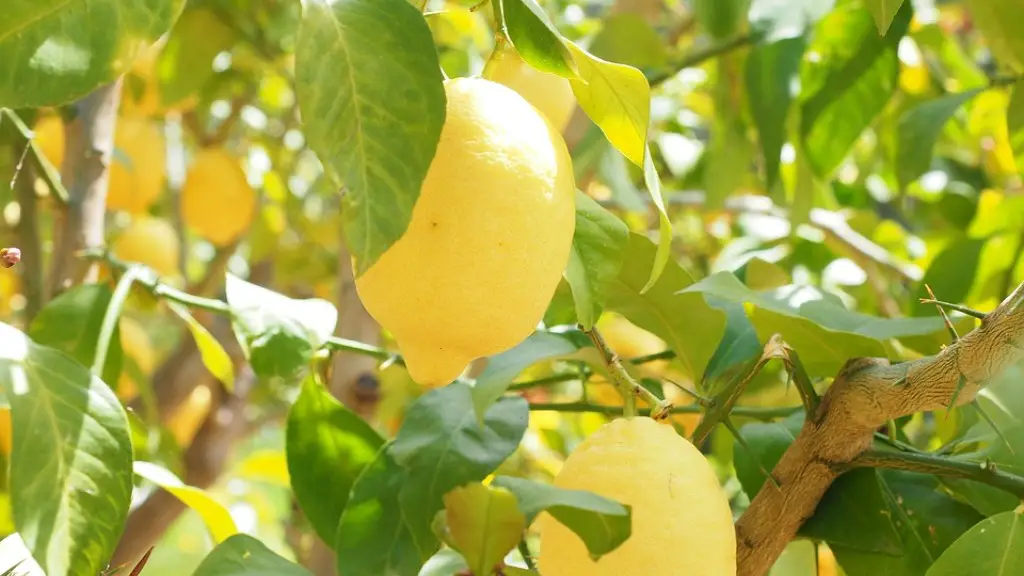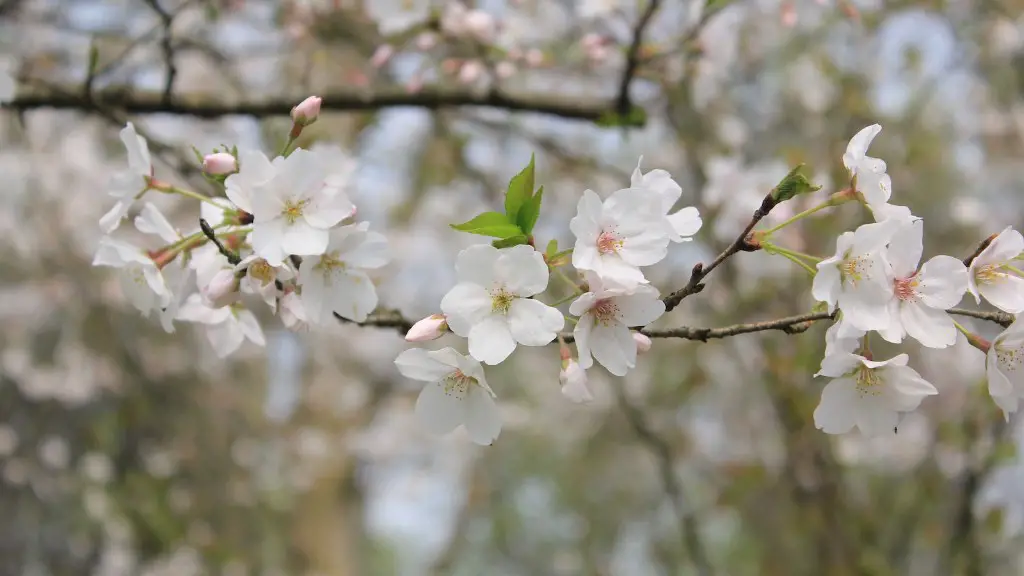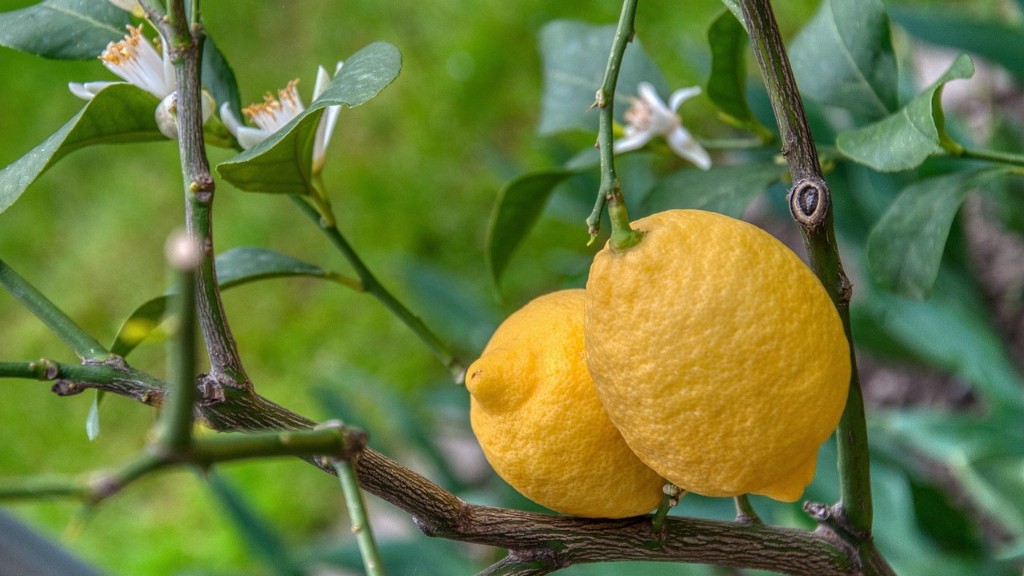There are many ways to accelerate the growth of a lemon tree. By following some basic guidelines and tips, you can get your lemon tree to produce fruit in no time. Here’s how to make a lemon tree grow faster:
Provide Enough Light: Lemon trees need lots of sunlight to grow and thrive, so make sure your tree gets at least six to eight hours of direct sunlight each day. If necessary, supplement natural sunlight with grow lights. This will help to speed up the growth of the lemon tree.
Water Regularly: Keep the soil around your lemon tree moist, but not soggy. Depending on the temperature and weather, you will probably need to water the tree once to twice a week. Make sure that the water drains quickly and doesn’t stand in the soil after you water the tree. This will help to prevent root rot.
Fertilize Regularly: To encourage your lemon tree to grow vigorously and heal itself quickly, use a fertilizer that is high in nitrogen. Apply the fertilizer every few weeks while the tree is actively growing. Follow the instructions on the fertilizer label to ensure you don’t overdose your tree.
Prune Unnecessary Growth: Prune the lemon tree in spring and again in summer. As the tree grows, remove any dead or diseased branches, and thin the tree’s canopy for better air circulation. This will help ensure that all the branches get enough light to produce plenty of fruit.
Avoid Submerging Roots: Keep in mind that lemon trees don’t do well in flooded conditions. Avoid watering the tree too often and make sure that the tree is not in a place where the roots are submerged in water. This may cause root rot, which can kill the tree.
Provide Mulch: Adding mulch to the soil around your lemon tree will help the soil retain moisture, which can help speed up the growth of the tree. Spread a layer of mulch, such as hay, around the base of the tree and replenish it as needed.
How To Ensure Your Tree Blooms
If you want your lemon tree to flower and produce fruit, it’s important to provide the right conditions. Make sure that the tree gets plenty of sunlight and keep the soil moist but not soggy. Fertilize the tree regularly and prune any unnecessary growth. You may also want to consider using bloom stimulating fertilizers, such as a fertilizer that is high in phosphorus, to encourage blooming.
Another way to ensure your lemon tree blooms is to provide it with plenty of air circulation. Make sure that the tree is not overcrowded and that there is enough space between the branches. This will allow air to flow freely and circulate around the tree.
Finally, temperatures play an important role in flower growth. Ideally, you should keep the temperature around your lemon tree between 45 and 85 degrees Fahrenheit. If the temperature drops too low, the flower buds may not open, and if it gets too high, the tree may suffer from the heat.
How To Protect Your Tree From Pests
Pests can impede growth and damage a lemon tree. To prevent pest infestations, inspect the tree regularly for signs of pests. Be on the lookout for tiny bugs, webbing and damage to the tree’s leaves, branches and fruit. If you notice any signs of pests, use an organic pesticide to get rid of them.
In addition to pesticides, you can also use homemade pest control techniques, such as spraying the tree with a solution of garlic, cayenne pepper and dish soap. You can also use neem oil to prevent and control pests on your lemon tree.
Keeping the area around your tree clean can also help to ward off pests. Remove any weeds, fallen leaves or dead branches that may attract pests. This will help ensure that your lemon tree is free from pests and can grow and produce fruit unhindered.
How To Prevent Disease
Diseases can cause your lemon tree to become unhealthy and stunt its growth. To prevent disease, it’s important to keep the tree from becoming stressed. Make sure the soil has adequate drainage and that the tree gets plenty of sunlight. Also, water the tree frequently, but not too often, to prevent the roots from becoming overloaded.
Mulch can also help to keep soil healthy and prevent diseases. Adding a layer of mulch around the tree will help to regulate the soil temperature and keep the soil moist. It will also help to prevent the spread of diseases in the soil.
You should also inspect the tree regularly for signs of disease. Look out for discolored or wilted leaves, spots on the leaves, weakened branches or stunted growth. If you notice any of these symptoms, prune the affected area, and treat the tree with an appropriate fungicide or pesticide.
How To Make Sure You Get Fresh Lemons
Growing lemons at home isn’t just about knowing how to make your lemon tree grow faster. It’s also about ensuring that your lemons are fresh and tasty when you harvest them. When the lemons start to turn yellow, it’s time to pick them. Lemons will ripen fully on the tree, so it’s best to pick them before they are too ripe, otherwise they may spoil quickly.
Once you’ve picked the lemons, store them in a cool, dry place and use them as soon as possible. If you can’t use them right away, you can freeze or pickle them or even make your own lemonade or limeade concentrate. This will prolong the life of your lemons and ensure that you’re always able to enjoy their fresh flavor.
How To Use The Lemons You Grow
There are many different ways to use the lemons you grow. You can use them in baking, in salads and sauces, or to flavor cocktails and other drinks. You can also use them to make your own cleaning products or to add extra zing to a dish. Lemons are versatile, so whatever your preference, you can find a use for your homegrown lemons.
Freshly-squeezed lemon juice is ideal for a variety of recipes, from desserts to main dishes. You can even use it in drinks, especially for making cocktails. And don’t forget about the lemon zest! Zest is perfect for adding a bright, citrusy flavor to any dish.
Lemons are also high in Vitamin C and are great for making homemade remedies like lemonade, lemon-honey tea, or gargling with lemon juice. You can also use it as a natural cleanser and deodorant, or put it in a diffuser to freshen the air. With so many uses for homegrown lemons, why not give it a go and see what you can come up with?



